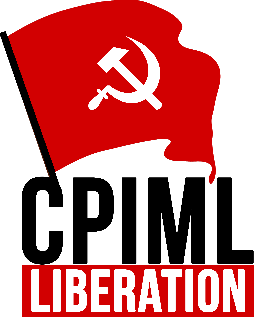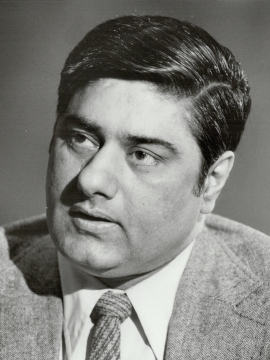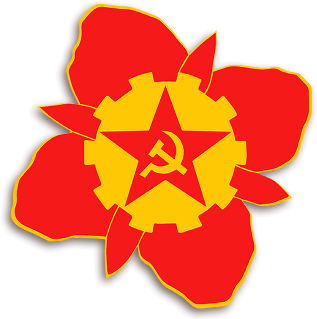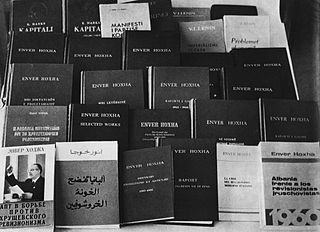
The Communist Party of India (Marxist–Leninist) (CPI (ML)) was an Indian communist party formed by the All India Coordination Committee of Communist Revolutionaries (AICCCR) at a congress in Calcutta in 1969. The foundation of the party was declared by Kanu Sanyal at a mass meeting in Calcutta on 22 April, Vladimir Lenin's birthday. Later the CPI(ML) party splintered into several Naxalite groups.

The Communist Party of India (Marxist–Leninist) Liberation (abbreviated: CPI(ML) or CPI-ML or CPIML(L) or CPI-ML(L) or CPIML Liberation) also referred to as the Liberation Group, is a Communist political party in India.
The Indian People's Front (IPF) was a mass front organisation founded in Delhi between 24–26 April 1982. It was conceptualised by Vinod Mishra and it was operated as the open mass front of the CPIML Liberation between 1982–1994. The front primarily worked for the social and economic upliftment of Adivasis, Dalits and impoverished sections of society and mobilised them through the means of unions, rallies and conventions.
Communist Party of India (Marxist-Leninist) Second Central Committee or CPI (M-L) 2nd CC is a political party in India. It emerged in 1973 when the pro-Charu Majumdar faction of the original CPI (M-L) got divided into pro and anti-Lin Piao groups. The CPI (M-L) 2nd CC represents the pro-Lin Piao stream. At present, the party is active in states like Bihar, Uttar Pradesh and West Bengal.
Socialism in India is a political movement founded early in the 20th century, as a part of the broader movement to gain Indian independence from colonial rule. The movement grew quickly in popularity as it espoused the causes of India's farmers and labourers against the zamindars, princely class and landed gentry. Socialism shaped the principal economic and social policies of the Indian government but mostly followed Dirigisme after independence until the early 1990s, when India moved towards a more market-based economy.
Communism in India has existed as a social or political ideology as well as a political movement since at least as early as the 1920s. In its early years, communist ideology was harshly suppressed through legal prohibitions and criminal prosecutions. Eventually, communist parties became ensconced in national party politics, sprouting several political offshoots.

The Naxalite–Maoist insurgency is an ongoing conflict between Maoist groups known as Naxalites or Naxals and the Indian government. The influence zone of the Naxalites is called the red corridor, which has been steadily declining in terms of geographical coverage and number of violent incidents, and in 2021 it was confined to the 25 "most affected" locations and 70 "total affected" districts across 10 states in two coal-rich, remote, forested hilly clusters in and around the Dandakaranya-Chhattisgarh-Odisha region and the tri-junction area of Jharkhand-Bihar and-West Bengal. The Naxalites have frequently targeted tribal, police and government workers in what they say is a fight for improved land rights and more jobs for neglected agricultural labourers and the poor.
Communist Party of India (Marxist–Leninist) People's War, usually called People's War Group (PWG), was an underground communist party in India. It merged with the Maoist Communist Centre of India to form the Communist Party of India (Maoist) in 2004. Muppala Lakshmana Rao ('Ganapathi') was the general secretary of the party. The ideology of the party was Marxism-Leninism-Maoism.

Baba Bujha Singh was an Indian revolutionary leader. He was an activist of the Ghadar Party and later became a key leader of the Lal Communist Party. Singh later became a symbol of the Naxalite movement in Punjab.
Moni Guha was an Indian communist.
The Central Organising Committee, Communist Party of India (Marxist–Leninist) Party Unity, more commonly known as CPI(ML) Party Unity or simply 'Party Unity', was a communist party in India 1982-1998. Narayan Sanyal alias Naveen Prasad was the general secretary of the party. Party Unity was the official organ of the party. CPI(ML) Party Unity was one of the predecessors of the Communist Party of India (Maoist).
Satyanarayan Singh was an Indian communist politician. Singh was one of the early leaders of the Communist Party of India (Marxist-Leninist), being its secretary in Bihar.

The Communist Party of Ireland (Marxist–Leninist) was an anti-revisionist political party based in Ireland. It had strong links to the Party of Labour of Albania, Communist Party of Canada (Marxist–Leninist) and Revolutionary Communist Party of Britain (Marxist–Leninist).

Hardial Bains was an Indo-Canadian microbiology lecturer, but was primarily known as the founder of a series of left-wing movements and parties foremost of which was the Communist Party of Canada (Marxist–Leninist). Presenting himself as staunchly anti-revisionist and pro-Stalinist, until his death, Bains acted as the spokesperson and ideological leader of the CPC (ML) — known in elections as the Marxist–Leninist Party of Canada. During his lifetime, Bains' outlook swung from supporting the Soviet Union under Joseph Stalin, to Mao Zedong's China, then later to Enver Hoxha's Albania. Shortly before he died, and abandoning his previous sharp criticisms of the country, Bains turned to Fidel Castro's Cuba for inspiration. Spending most of his life in Canada, Bains was also politically active in England, Ireland, United States and India.

The Communist Party of Canada (Marxist–Leninist) is a Canadian federal political party founded by Hardial Bains in 1970. The CPC(M-L) has been registered with Elections Canada as the Marxist–Leninist Party of Canada (MLPC) since 1974 as the party is prohibited from using the Communist Party name in Canadian elections to avoid confusion among voters. The party developed separately and independently from the Communist Party of Canada (CPC), originating among students and intellectuals in Canada during the 1960s. After a period of alignment with Maoism and China, the CPC(M-L) pursued a Hoxhaist, pro-Albanian line until the early 1990s. At present, the party directs most of its public support to Cuba and North Korea.

Hoxhaism is a variant of anti-revisionist Marxism–Leninism that developed in the late 1970s due to a split in the anti-revisionist movement, appearing after the ideological dispute between the Chinese Communist Party and the Party of Labour of Albania in 1978. The ideology is named after Enver Hoxha, a notable Albanian communist leader, who served as the First Secretary of the Party of Labour.
Sushital Ray Chowdhary was an Indian Communist intellectual and founder member of Communist Party of India (Marxist-Leninist). He was the editor of the organs of the CPI, CPI(M) and CPI(ML). He eventually fell out with the mainstream Charu Majumdar group and died of a heart attack in March, 1971.
Anti-revisionism is a position within Marxism–Leninism which emerged in the 1950s in opposition to the reforms of Soviet leader Nikita Khrushchev. Where Khrushchev pursued an interpretation that differed from his predecessor Joseph Stalin, the anti-revisionists within the international communist movement remained dedicated to Stalin's ideological legacy and criticized the Soviet Union under Khrushchev and his successors as state capitalist and social imperialist.
Central Organising Committee, Communist Party of India (Marxist–Leninist) was a communist party in India, one of the main splinter factions of the original Communist Party of India (Marxist–Leninist). COC, CPI(ML) occupied a middle position between the pro-Charu Majumdar group led by Mahadev Mukherjee and the anti-Majumdar group led by Satyanarayan Singh. Failing to articulate a common ideological position, COC, CPI(ML) soon suffered internal divisions and splits. Two of the splinter groups of COC, CPI(ML) in Andhra Pradesh are predecessors of the present-day Communist Party of India (Maoist).








